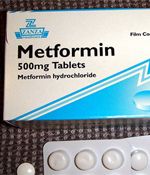Neoadjuvant Metformin Exhibits ‘Promising Effects’ in Prostate Cancer
Use of neoadjuvant metformin prior to radical prostatectomy helped to reduce metabolic effects and slow the growth rate of cancer in a single-center phase II study conducted among men with confirmed prostate cancer.
CHICAGO-Use of neoadjuvant metformin prior to radical prostatectomy helped to reduce metabolic effects and slow the growth rate of cancer in a single-center phase II study conducted among men with confirmed prostate cancer. Findings were reported by Anthony M. Joshua, MBBS, PhD, staff medical oncologist at the Princess Margaret Hospital, University Health Network, Toronto (AACR 2012 abstract CT-04).

Use of neoadjuvant metformin prior to radical prostatectomy helped to reduce metabolic effects and slow the growth rate of cancer among men with confirmed prostate cancer.
Metformin, an inhibitor of the complex 1 in the respiratory chain, is widely used in treatment of diabetes to reduce insulin resistance and is currently being investigated for use as a chemopreventive agent in several types of cancer. The major molecular targets of metformin are the liver kinase B1 (LKB1)-AMP-activated protein kinase (AMPK) signaling and mammalian target of rapamycin (mTOR) pathways, which play a key role in the control of cell division and cell proliferation. “These actions provide significant rationale to evaluate metformin’s utility in prostate cancer,” said Dr. Joshua.
Twenty-two men with prostate cancer (median age, 64 years; range, 45-70 years) were treated with up to 500 mg of metformin 3 times a day prior to undergoing prostatectomy. Patients being treated with any drug used to treat any form of diabetes were excluded from the study. The primary objectives were to demonstrate safety and tolerability of neoadjuvant metformin administration and to document changes in phospho-AKT signaling indices. Baseline characteristics included median PSA 6 ng/mL (range, 3.22-36.11 ng/mL). Median duration of treatment was 41 days. No grade 3 adverse events were reported and all patients underwent subsequent radical prostatectomy with no metformin-related adverse effects.
Significant pre- and post-therapy changes were noted in serum insulin-like growth factor-1 levels (P = .02), fasting glucose (P = .03), body mass index (P < .01), and waist-to-hip ratio (P < .01). A trend for prostate-specific antigen (PSA) reduction (P = .08) was also observed. There were no correlations between any metabolic, morphometric, or cancer-related serum indices. The investigators concluded that neoadjuvant metformin is well tolerated prior to radical prostatectomy.
“At the moment, the study builds on the laboratory and epidemiological data indicating that metformin remains a promising agent in early-stage prostate cancer,” Dr. Joshua said in an interview with CancerNetwork. “But further work needs to be done to determine which patients would benefit from it. In particular, the end point of our study was simply pathological (proportion of cells growing) and we need to translate this into a study end point that would benefit patients, such as rates of recurrence of cancer or decreases in PSA.”
“This is a very interesting and promising study, as it establishes that metformin has promising effects on metabolic parameters when given to prostate cancer patients at tolerable doses,” commented Leonidas C. Platanias, MD, PhD, deputy director, Robert H. Lurie Comprehensive Cancer Center, and professor of oncology and professor of medicine, Northwestern University Medical School, Chicago. “There was also a trend for reduction in PSA, which is a marker for cancer activity. It is possible that higher doses of metformin would have more potent antitumor effects in cancer patients, and dose-escalation studies using this drug may be warranted.
“This is clearly an area I have an interest in also,” he added. Dr. Platanias and his colleagues at Northwestern are planning a clinical trial of metformin in combination with chemotherapy (cytarabine) for patients with acute myelogenous leukemia.
Metformin is also being evaluated for use in protecting against liver cancer, lowering risk of oral cancer, and-in combination with vascular endothelial growth factor-A (VEGF-A)-suppression of tumor growth in melanoma tumors with BRAF mutations.